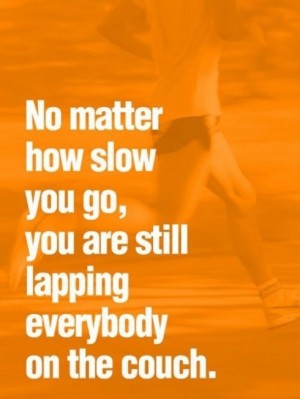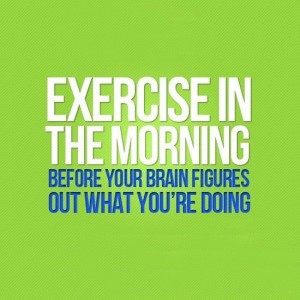What I Know About Running for Beginners
 I’m not a great runner by any means. But what I am is a moderately good runner who only began running somewhat consistently close to 2 years ago. My running technique has gotten better over time, or so I hope it has and I feel like I can provide some insight into running for anyone who is considering getting started. Here is what I know about running for beginners from a beginner (myself). 1. Embrace the suck. Running sucks. It sure does. Anyone who says running doesn’t suck is some kind of genetic freak. I’ve been running for almost an entire year on the running path around my neighborhood that is 2.5 miles – and that 2.5 miles sucks just as much today as it did a year ago. The hills are not easier and the distance is not closer. The only thing that is awesome about running is how good you feel once you finish it. And that’s not because running feels amazing, that’s because you don’t have to run anymore for the time being. My suggestion is to embrace the suck and remember how good it is for your body to get in a run no matter how long you run for. A great Pinterest quote that comes to mind is “No matter how slow you go, you’re still lapping everyone on the couch.” I run to burn calories and for heart health – not because running is thrilling. It’s just not.
I’m not a great runner by any means. But what I am is a moderately good runner who only began running somewhat consistently close to 2 years ago. My running technique has gotten better over time, or so I hope it has and I feel like I can provide some insight into running for anyone who is considering getting started. Here is what I know about running for beginners from a beginner (myself). 1. Embrace the suck. Running sucks. It sure does. Anyone who says running doesn’t suck is some kind of genetic freak. I’ve been running for almost an entire year on the running path around my neighborhood that is 2.5 miles – and that 2.5 miles sucks just as much today as it did a year ago. The hills are not easier and the distance is not closer. The only thing that is awesome about running is how good you feel once you finish it. And that’s not because running feels amazing, that’s because you don’t have to run anymore for the time being. My suggestion is to embrace the suck and remember how good it is for your body to get in a run no matter how long you run for. A great Pinterest quote that comes to mind is “No matter how slow you go, you’re still lapping everyone on the couch.” I run to burn calories and for heart health – not because running is thrilling. It’s just not.
Disclaimer: those who love running - I envy you. If I loved running maybe I'd do it way more often.
 2. Get good gear. Your shoes can make all the difference between a good run and a crappy run. Most avid runners get new shoes every 300-400 miles. My suggestion is to find a great pair of running shoes that fit your foot and your arch. Go to a running store for help – they will measure your foot, analyze your steps and make suggestions.
2. Get good gear. Your shoes can make all the difference between a good run and a crappy run. Most avid runners get new shoes every 300-400 miles. My suggestion is to find a great pair of running shoes that fit your foot and your arch. Go to a running store for help – they will measure your foot, analyze your steps and make suggestions.
Other gear you should look into for cold weather are: gloves, beanie cap or headband (to cover your ears), neck warmer or scarf, base layers, compression pants, cold weather tops, tops and pants with pockets (to store a key and some tissues), a windbreaker or other warm coat, etc.
Other gear you should look into for warm weather are: quality sports bras, socks, running shorts and/or spandex shorts to avoid chafing, sweat wicking tops and water bottle holders, clothing with pockets to hold a key.
Having the right gear for running will make your life easier when it comes to getting on the road (or treadmill) for an extended period of time. Plus, if you feel good in your clothes you’re more likely to actually wear them and workout.
3. Cars do not look out for runners. Ever. Even in my geriatric filled gated community the stop signs are most often ignored and cars have had to be dodged. Then the driver looks at me as if I did something wrong. Your best bet is to assume they are not going to stop and to look out for yourself. Run against traffic and stay on sidewalks as often as possible. Find a route that has little to no blind bends, well lit and one that is not closed off to the public.
4. Change your attitude and just do it. If you tell yourself that you don't want to go for a run, you won't. But if you just do it without thinking about it you’re more likely to get it done and feel good about it afterward (even in the cold weather). Whether you get up early or run in the afternoon, the key is to put on your gear and go before your brain has time to figure out what you’re doing.
 5. Don’t put so much focus on your breathing. There are plenty of running experts who recommend breathing in on certain steps and exhaling on others. But what I find is that when I consciously think about my breathing, it then goes out of rhythm and I become out of breath. Often times your breathing will naturally fall in line with your gate and it’s at that time you should just let it be. If you do find yourself out of breath or unable to breath well during a run, you can then focus on various breathing techniques like the ones found here and here. My biggest suggestion, don't ever hold your breath - that holds true for any exercise you take part in.
5. Don’t put so much focus on your breathing. There are plenty of running experts who recommend breathing in on certain steps and exhaling on others. But what I find is that when I consciously think about my breathing, it then goes out of rhythm and I become out of breath. Often times your breathing will naturally fall in line with your gate and it’s at that time you should just let it be. If you do find yourself out of breath or unable to breath well during a run, you can then focus on various breathing techniques like the ones found here and here. My biggest suggestion, don't ever hold your breath - that holds true for any exercise you take part in.
Remember, my tips are for beginners from a beginner. These are all real world experiences and thoughts I have while running. If you want to start running to burn calories and better your health, then just getting out and going is good enough. But if you’re someone who wants to run marathons and compete in races, you will want to do further research in to how to make the most out of your running experience.